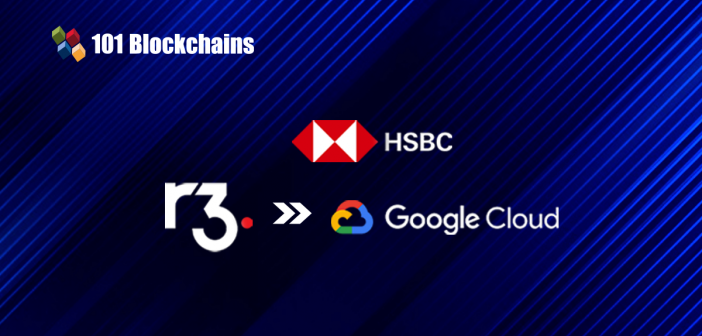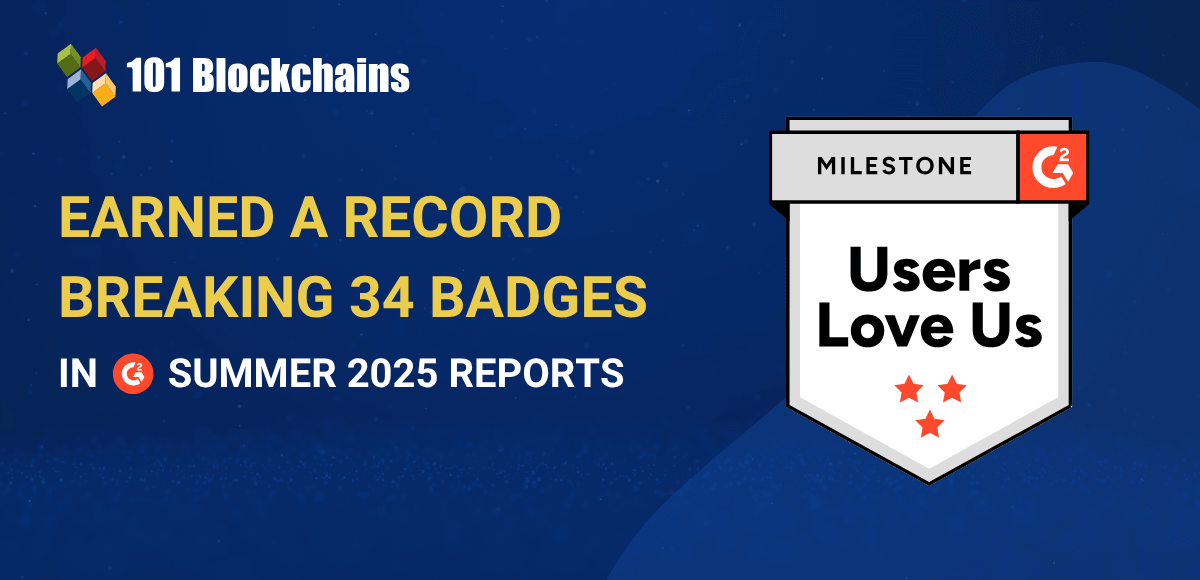Learn how blockchain truly works, master key definitions, and uncover what makes smart contracts so "smart." Dive into the fundamentals, gain valuable insights, and start your blockchain journey today!

- News & Updates
Gwyneth Iredale
- on March 09, 2021
HSBC Became First to Use Corda Enterprise Blockchain on Google Cloud
The world of Blockchain is going through many drastic changes in recent times, with various sectors adopting blockchain for distinct purposes. HSBC has recently announced that it has moved R3’s Corda Enterprise blockchain platform to Google Cloud. Most important of all, HSBC is the first financial institution to have achieved such a feat.
The news of HSBC moving Corda Blockchain to Google Cloud sets new benchmarks for the financial institutions looking forward to adopting blockchain. Such an initiative shows promising potential in terms of reducing client onboarding times by many weeks. As a result, it can help in achieving a substantial reduction of costs alongside viable improvements in client experience.
HSBC bank is presently leveraging Corda technology of R3 for its own custody blockchain platform, Digital Vault. The primary objective of HSBC in pursuing the use of blockchain is directed at supporting the custody of digital asset classes in the future. The transition of Corda technology to Google Cloud could offer the option for HSBC to move additional share of the transaction lifecycle to the ledger in the future. The move will also help the bank in issuing digital tokens rather than paper certificates.
HSBC had launched the Digital Vault service in November 2019. It serves the functions of digitizing the transaction records for private placement assets. The private placement assets under the scope of Digital Vault service include real estate, equity, and debt. As a result, global custody clients could use Digital Vault for direct, real-time access to details of their private assets.
Now, global custody clients don’t have to request the bank to search paper-based records anymore. On the contrary, clients could easily maintain a tab on the progress of receiving a coupon for private debt transactions. Clients could also conduct an audit of the transaction records flexibly with the Digital Vault service. HSBC has rolled out the Digital Vault only in Asia presently and will be available in other regions in the future.
The Corda enterprise blockchain platform of a software firm, R3, can help businesses in carrying out direct and private transactions by leveraging smart contracts. The use of smart contracts helps in streamlining business operations while reducing the costs of transactions and recordkeeping.
HSBC and R3 Corda, and Google Cloud have had a long history together. As a matter of fact, HSBC conducted the first live trade finance transaction on the Corda platform in May 2018. The bank used the enterprise blockchain platform for conducting a transaction for a bulk shipment for the food conglomerate, Cargill. As of February 2020, HSBC had announced that it had invested around $10 billion in paper-based private placement records on Corda.
Similarly, HSBC has been a flagship customer of Google Cloud for a long time. The presence of HSBC at the Next 2017 event, along with Verizon and Colgate, showed the enterprise goals of Google Cloud to the broader market. Although HSBC entered into a ‘long-term strategic cloud agreement’ with AWS, it still continues to maintain the association with Google Cloud. The cloud roadmap of HSBC also highlights the bank’s relationship with CloudBees, a CD software provider, and Jenkins arbiter. HSBC invested a staggering $10 million in CloudBees in 2019, thereby indicating the efficiency of its cloud strategy.
HSBC has been taking serious strides in leveraging the best of blockchain and cloud technologies. The bank had planned to shift around $20 billion out of the $50 billion privately placed assets in the custody of HSBC. Basically, the plan of HSBC was to start with a very tiny fraction of the total assets in the custody of HSBC. At the same time, HSBC also engaged in various other blockchain initiatives.
For example, the bank offers its own on-chain settlement solution to facilitate bond issuance on the digital asset platform of Singapore Exchange (SGX). In addition, HSBC has also been a prominent player in the growth of the Contour trade finance platform, which also utilizes the power of Corda. Furthermore, HSBC also participates in the ‘we.trade’ finance network.
At the same time, Google Cloud has also shown promises for hosting DLT networks and public blockchains. As one of the members of the governing council of Hedera Hashgraph, Google Cloud hosts nodes. Furthermore, Google Cloud has also shown a profound interest in hosting the nodes on EOS public blockchain.
The Head of Distributed Ledger Technology and Tokenization, Markets & Security Services at HSBC, Gaurav Aggarwal, stated that “As the first financial institution to shift Corda enterprise blockchain platform to Google Cloud, HSBC has shown solid proof of its commitment to blockchain and cloud technologies.” He further added, “This move will help in reducing costs and the onboarding times while preparing us for the future where we can store the full transaction lifecycle on a distributed ledger”.
The Vice President, Global Financial Services at Google Cloud, Derek White, stated, “HSBC is getting ready for the future of banking. And, we are proud to be their partner in this journey. We are committed to offering the speed, scalability, and security functionalities of cloud technology for HSBC. It can help in bringing consumers, businesses, and ecosystems together in new innovations”.
The Chief Revenue Officer at R3, Cathy Minter, expressed her positive views on the latest move by HSBC. She said, “Blockchain has huge potential for supporting the custody of digital asset classes in the future. The Digital Vault service of HSBC has shown promising practical implementation for the same”. Cathy Minter also stated that “The transition of Corda Enterprise Blockchain to Google Cloud by HSBC will help clients with lower costs and faster onboarding times.
Corda is powered with the highest standards of security and privacy as its foundational principles. So, it can support HSBC’s vision for empowering its global custody clients. Now, the global custody clients could gain secure, direct, and real-time access to details of their private assets.
Since HSBC is a large banking and financial service organization, it can serve the role of a pioneer in the blockchain. Other organizations in the financial services landscape can look up to HSBC and its initiatives in blockchain for inspiration. Furthermore, the global presence of HSBC also creates a strong foundation for it to drive the trend of blockchain adoption. The support of R3 in digital industry transformation along with Google Cloud to offer enterprise-grade cloud solutions could help HSBC. The bank can easily streamline its services and operations further.




